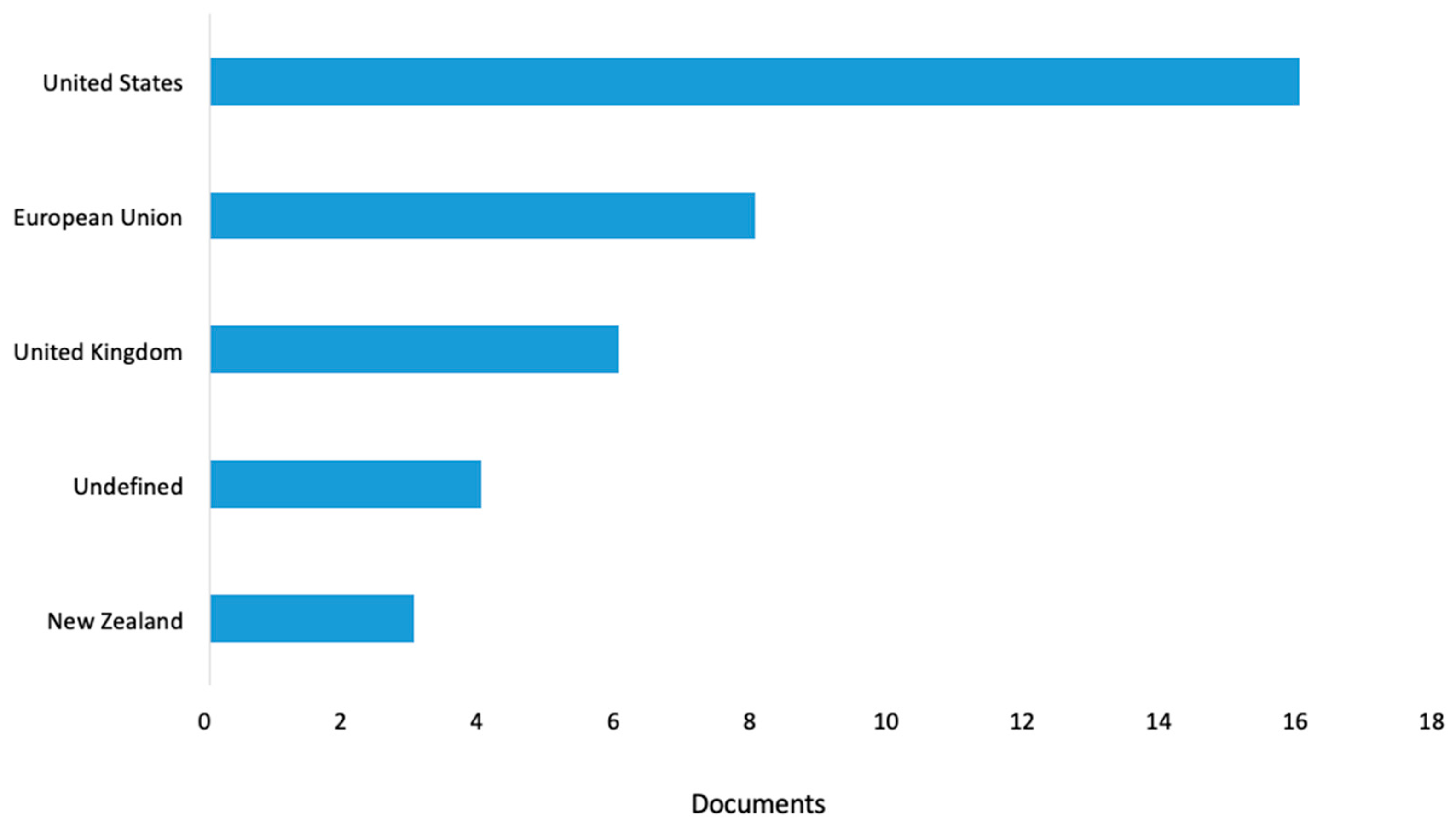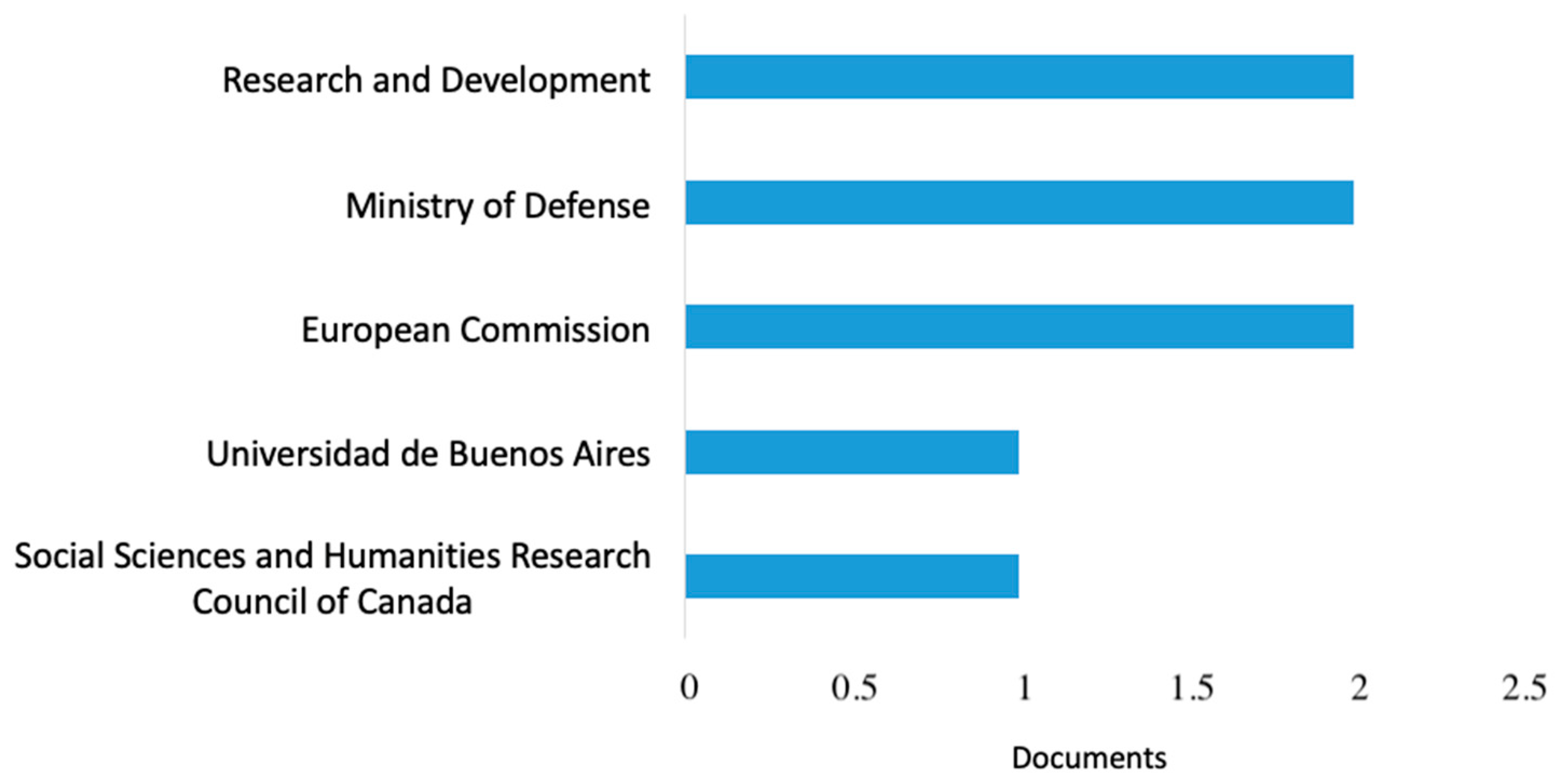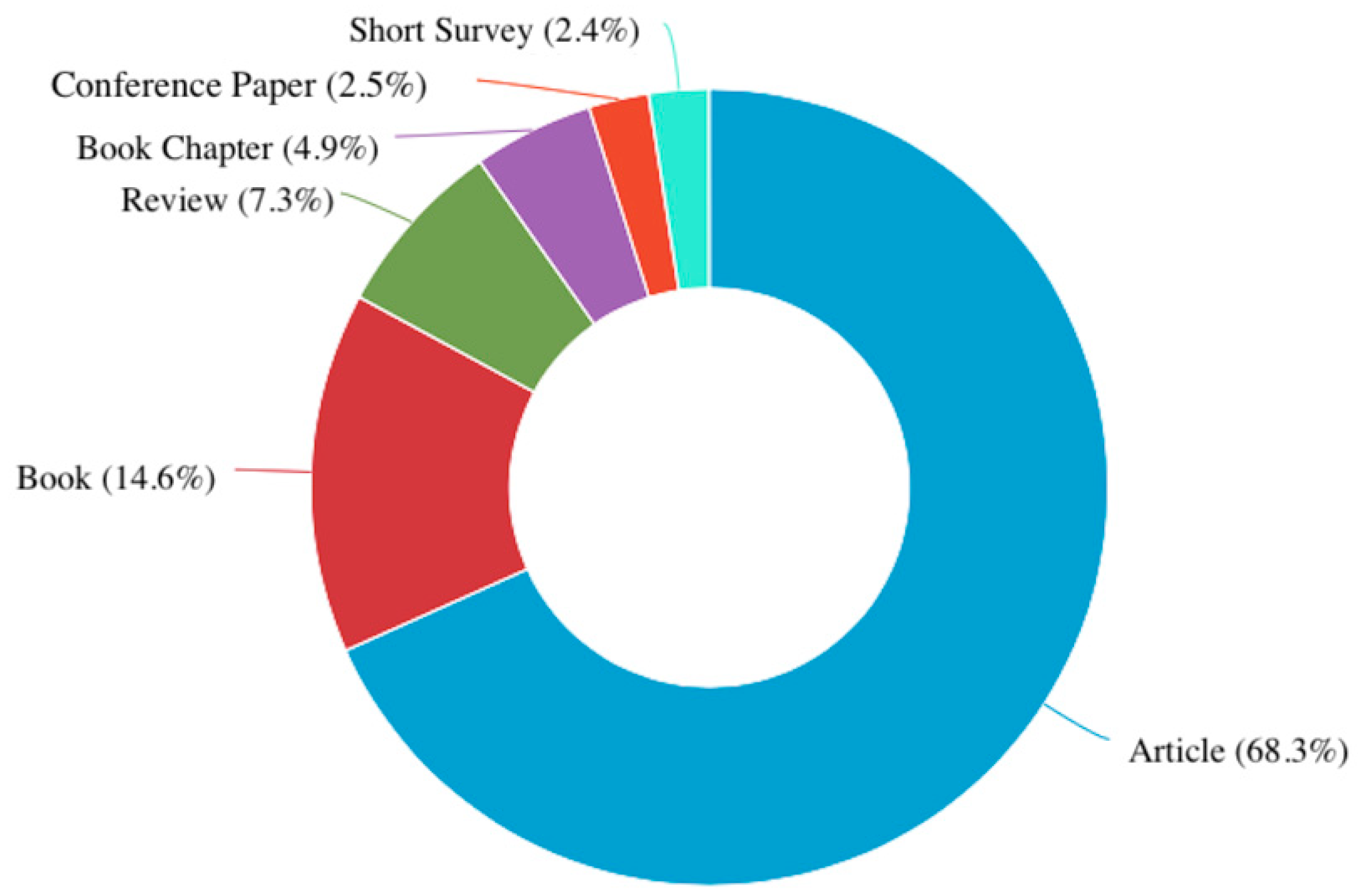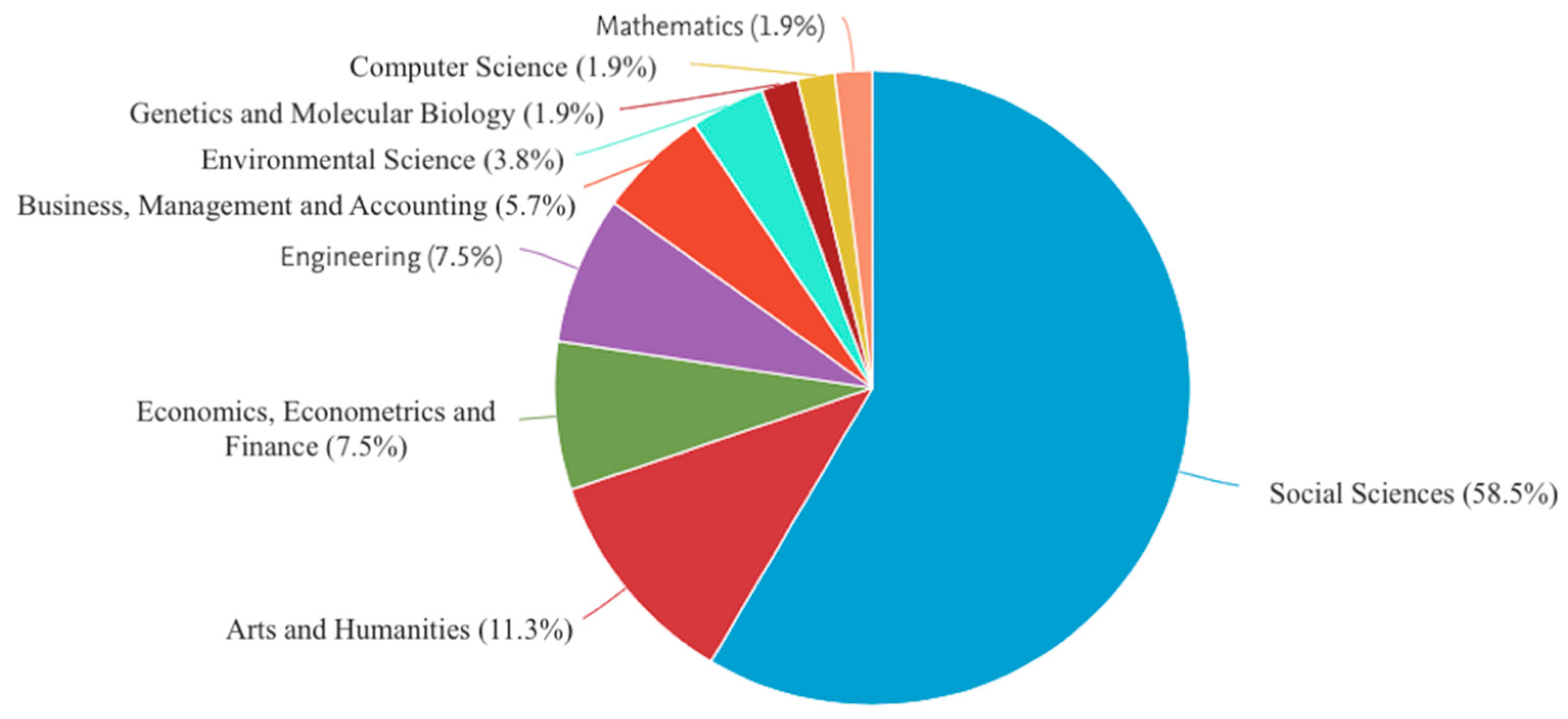Politics, Power, and Influence: Defense Industries in the Post-Cold War
Abstract
1. Introduction
- RQ1:
- How is the nature of war influencing the defense industry in the post-Cold War?
- RQ2:
- How can the industrial defense sector contribute to the stratification of political power in the international system as a stabilizer or catalyst for wars and conflicts?
2. Conceptual Background
2.1. Politics, Power, and Influence
2.2. Crisis, Conflict, and War
2.3. Defense Industry in Post-Cold War
3. Methodology
4. Findings and Discussion
4.1. Quantitative Analysis
4.2. Qualitative Analysis
5. Conclusions
5.1. Contributions to Theory
5.2. Contributions to Practice
5.3. Research Limitations
5.4. Recommendations for Future Research
Funding
Institutional Review Board Statement
Informed Consent Statement
Data Availability Statement
Conflicts of Interest
References
- Altman, David, Frederico Rojas-de-Galarreta, and Francisco Urdinez. 2020. An interactive model of democratic peace. Journal of Peace Research. [Google Scholar] [CrossRef]
- Rosete, Ana, Barbara Soares, Juliana Salvadorinho, João Reis, and Marlene Amorim. 2020. Service robots in the hospitality industry: An exploratory literature review. In International Conference on Exploring Service Science. Cham: Springer, pp. 174–86. [Google Scholar]
- Azis, Iwan. 2009. Crisis, Complexity and Conflict. Bingley: Emerald Group Publishing. [Google Scholar]
- Barrinha, André. 2010. Moving towards a European defence industry? The political discourse on a changing reality and its implications for the future of the European Union. Global Society 24: 467–85. [Google Scholar] [CrossRef]
- Besch, Sophia. 2019. The European Commission in EU Defense Industrial Policy. Carnegie Europe. 22. Available online: https://carnegieendowment.org/files/9-23-19_Besch_EU_Defense.pdf (accessed on 30 December 2020).
- Bitzinger, Richard. 2003. Towards a Brave New Arms Industry. New York: Routledge. [Google Scholar]
- Brecher, Michael. 1996. Introduction: crisis, conflict, war—State of the discipline. International Political Science Review 17: 127–39. [Google Scholar] [CrossRef]
- Brune, Sophie-Charlotte, Anne Kovacs, Anaïs Rending, and Maryse Penny. 2015. Crisis and Conflict Prevention strategies. Santa Monica: An International Comparison. [Google Scholar]
- Bryman, Alan, and Bob Burgess. 2002. Analyzing Qualitative Data. London: Routledge. [Google Scholar]
- Buchanan, David, and Richard Badham. 2020. power, Politics, and Organizational Change. New York: SAGE Publications Limited. [Google Scholar]
- Calcara, Antonio. 2017. Italy’s defence policy in the European context: the case of the European Defence Agency. Contemporary Italian Politics 9: 277–301. [Google Scholar] [CrossRef]
- Castro, Renato Cruz. 2020. From appeasement to soft balancing: The duterte administration´s shifting policy on the South China Sea imbroglio. Asian Affairs: An American Review, 1–27. [Google Scholar] [CrossRef]
- Chin, Warren. 2019. Technology, war and the state: past, present and future. International Affairs 95: 765–83. [Google Scholar] [CrossRef]
- Crenshaw, Martha. 2001. Terrorism. In International Encyclopedia of the Social & Behavioral Sciences. Amsterdam: Elsevier, pp. 15604–6. [Google Scholar]
- Deutsch, Karl. 1967. On the concepts of politics and power. Journal of International Affairs 21: 232–41. [Google Scholar]
- Dimitriu, George. 2020. Clausewitz and the politics of war: A contemporary theory. Journal of Strategic Studies 43: 645–85. [Google Scholar] [CrossRef]
- Dülffer, Jost. 2020. The democratic peace controversy in retrospect as a “Civilizing Mission”? A theory revisited. Civilizing Missions in the Twentieth Century, 142–76. [Google Scholar] [CrossRef]
- Dyson, Tom. 2016. Neoclassical Realism and Defence Reform in Post-Cold War Europe. Berlin/Heidelberg: Springer. [Google Scholar]
- Edhlund, Bengt, and Allan McDougall. 2019. NVivo 12 Essentials. Sweden: Form & Kunskap. [Google Scholar]
- Ellegaard, Ole, and Johan Wallin. 2015. The bibliometric analysis of scholarly production: How great is the impact? Scientometrics 105: 1809–31. [Google Scholar] [CrossRef] [PubMed]
- Falagas, Matthew, Eleni Pitsouni, George Malietzis, and Georgios Pappas. 2008. Comparison of Pubmed, Scopus, web of science, and google scholar: strengths and weaknesses. The FASEB Journal 22: 338–42. [Google Scholar] [CrossRef]
- Fink, Arlene. 2005. Conducting Research Literature Reviews: From Paper to the Internet, 2nd ed. Thousand Oaks: SAGE Publications. [Google Scholar]
- Fiott, Daniel. 2017. Patriotism, preferences and serendipity: Understanding the adoption of the defence transfers directive. JCMS: Journal of Common Market Studies 55: 1045–61. [Google Scholar] [CrossRef]
- Fletcher, George. 2006. The indefinable concept of terrorism. Journal of International Criminal Justice 4: 894–911. [Google Scholar] [CrossRef]
- Galinsky, Adam, Deborah Gruenfeld, and Joe Magee. 2003. From power to action. Journal of Personality and Social Psychology 85: 453. [Google Scholar] [CrossRef] [PubMed]
- Genevaz, Juliette. 2019. Defense education in Chinese universities: Drilling elite youth. Journal of Contemporary China 28: 453–67. [Google Scholar] [CrossRef]
- Given, Lisa. 2008. SAGE Encyclopedia of Qualitative Research Methods. Thousand Oaks: SAGE Publications. [Google Scholar]
- Greenwood, Chistopher. 1987. The concept of war in modern international law. The International and Comparative Law Quarterly 36: 283. [Google Scholar] [CrossRef]
- Greenwood, Christopher. 2002. International law and the “War against terrorism”. International Affairs 78: 301–17. [Google Scholar] [CrossRef]
- Gregory, William. 1993. The Price of Peace: The Future of Defense Industry and High Technology in a Post-Cold War World. Lanham: Lexington Books. [Google Scholar]
- Gutterman, Ellen, and Andrea Lane. 2017. Beyond LAVs: Corruption, commercialization and the Canadian defence industry. Canadian Foreign Policy Journal 23: 77–92. [Google Scholar] [CrossRef]
- Hartley, Keith. 2003. The future of European defence policy: An economic perspective. Defence and Peace Economics 14: 107–15. [Google Scholar] [CrossRef]
- Harzing, Anne-Wil, and Satu Alakangas. 2016. Google scholar, Scopus and the web of science: A longitudinal and cross-disciplinary comparison. Scientometrics 106: 787–804. [Google Scholar] [CrossRef]
- Huntington, Samuel. 2000. The clash of civilizations? In Culture and Politics. New York: Palgrave Macmillan, pp. 99–118. [Google Scholar]
- Jenkins, Brian. 1985. International Terrorism: The Other World War. Santa Monica: Rand Corp. Available online: https://apps.dtic.mil/sti/citations/ADA163576 (accessed on 21 November 2020).
- Jesson, Jill, Lydia Matheson, and Fiona Lacey. 2011. Doing Your Literature Review: Traditional and Systematic Techniques. Thousand Oaks: SAGE Publications. [Google Scholar]
- Kaldor, Mary. 2013. New and Old Wars: Organised Violence in a Global Era. Hoboken: John Wiley & Sons. [Google Scholar]
- Kellner, Douglas. 2007. Globalization, terrorism, and democracy: 9/11 and its aftermath. In Frontiers of Globalization Research. Boston: Springer, pp. 243–68. [Google Scholar]
- Keltner, Dacher, Deborah Gruenfeld, and Cameron Anderson. 2003. power, approach, and inhibition. Psychological Review 110: 265. [Google Scholar] [CrossRef]
- Kenny, Brian. 2006. European armaments collaboration and integration. Leadership and Organization Development Journal 27: 484–500. [Google Scholar] [CrossRef]
- Kurç, Çağlar, and Stephanie Neuman. 2017. Defence industries in the 21st century: A comparative analysis. Defence Studies 17: 219–27. [Google Scholar] [CrossRef]
- Kurç, Çağlar. 2017. Between defence autarky and dependency: the dynamics of Turkish defence industrialization. Defence Studies 17: 260–81. [Google Scholar] [CrossRef]
- Kurian, Nimmi. Defence Modernization in China: An Overview. International Studies 37: 243–254. [CrossRef]
- Kutz, Christopher. 2020. On War and Democracy. Princeton: Princeton University Press. [Google Scholar] [CrossRef]
- Laws, Eric, and Bruce Prideaux. 2006. Crisis management: A suggested typology. Journal of Travel & Tourism Marketing 19: 1–8. [Google Scholar]
- Lebow, Richard Ned. 2020. Between Peace and War, 40th ed. London: Springer. [Google Scholar] [CrossRef]
- Martín-Martín, Alberto, Mike Thelwall, Enrique Orduna-Malea, and Emilio Delgado López-Cózar. 2020. Google Scholar, Microsoft Academic, Scopus, Dimensions, Web of Science, and OpenCitations’ COCI: A multidisciplinary comparison of coverage via citations. arXiv arXiv:2004.14329. [Google Scholar]
- Maye, Diane. 2017. Autarky or interdependence: US vs. European security and defense industries in a globalized market. Journal of Strategic Security 10: 33–47. [Google Scholar] [CrossRef]
- McFaul, Michael. 2020. Cold War lessons and fallacies for US-China relations today. The Washington Quarterly 43: 7–39. [Google Scholar] [CrossRef]
- Mearsheimer, John. 1990. Back to the future: Instability in Europe after the cold war. International Security 15: 5–56. [Google Scholar] [CrossRef]
- Meijer, Hugo. 2010. Post-Cold War trends in the European defence industry: Implications for transatlantic industrial relations. Journal of Contemporary European Studies 18: 63–77. [Google Scholar] [CrossRef]
- Moher, David, Alessandro Liberati, Jennifer Tetzlaff, Douglas Altman, and PRISMA Group. 2009. Preferred reporting items for systematic reviews and meta-analyses: The PRISMA statement. PLoS Medicine 6: e1000097. [Google Scholar] [CrossRef]
- Mueller, John. 1990. The obsolescence of major war. Bulletin of Peace Proposals 21: 321–28. [Google Scholar] [CrossRef]
- Neuman, Stephanie. 2006. Defense industries and global dependency. Orbis 50: 429–51. [Google Scholar] [CrossRef]
- Neuman, Stephanie. 2010. power, influence and hierarchy: defense industries in a unipolar world. Defense and Peace Economics 21: 105–34. [Google Scholar] [CrossRef]
- Palonen, Kari. 2003. Four times of politics: Policy, polity, politicking, and politicization. Alternatives 28: 171–86. [Google Scholar] [CrossRef]
- Pasandideh, Shahryar. 2020. Do China´s New Islands allow it to militarily dominate the South China Sea? Asian Security, 1–24. [Google Scholar] [CrossRef]
- Pernica, Bohuslav. 2020. The Czech defence and security industry: taking the pulse to an ailing man. Defense & Security Analysis 36: 234–44. [Google Scholar]
- Perry, David. 2016. Without Foreign Sales, Canada´s defence Industry Would not Survive. The Globe and Mail. Available online: https://www.theglobeandmail.com/report-on-business/rob-commentary/without-foreign-arms-sales-canadas-defence-industry-would-not-survive/article28100442/ (accessed on 23 November 2020).
- Petticrew, Mark, and Helen Roberts. 2008. Systematic Reviews in the Social Sciences: A Practical Guide. Hoboken: John Wiley & Sons. [Google Scholar]
- PwC. 2005. The Defense Industry in the 21st Century. PricewaterhouseCoopers. Available online: https://www.pwc.pl/en/publikacje/defence_industry_ads.pdf (accessed on 13 November 2020).
- Raska, Michael. 2020. The sixth RMA wave: Disruption in Military Affairs. Journal of Strategic Studies. [Google Scholar] [CrossRef]
- Reis, João, Marlene Amorim, and Nuno Melão. 2019. Multichannel service failure and recovery in a O2O era: A qualitative multi-method research in the banking service industry. International Journal of Production Economics 215: 24–33. [Google Scholar] [CrossRef]
- Reis, João, Paula Santo, and Nuno Melão. 2020. Impact of artificial intelligence research on politics of the European Union member states: The case study of Portugal. Sustainability 12: 6708. [Google Scholar] [CrossRef]
- Rezende, Leandro, Paul Blackwell, and Marcos Degaut. 2018. Brazilian National Defence Policy: Foreign policy, national security, economic growth, and technological innovation. Defense & Security Analysis 34: 385–409. [Google Scholar]
- Russell, Bertrand. 1938. power: A New Social Analysis. London: Allen & Unwin. [Google Scholar]
- Sachar, B. 2004. Military diplomacy through arms transfers: A case study of China. Strategic Analysis 28: 290–310. [Google Scholar] [CrossRef]
- Sanyal, Shubhra. 2020. Understanding Terrorism and Its Dynamics—A Holistic Approach. Agni Studies on International Strategic Issues. The Journal of FSSS XXIII. [Google Scholar] [CrossRef]
- Sarkees, Meredith, Frank Whelon Wayman, and David Singer. 2003. Inter-state, intra-state, and extra-state wars. A comprehensive look at their distribution over time, 1816–997. International Studies Quarterly 47: 49–70. [Google Scholar] [CrossRef]
- Scopus. 2020. Data, Curated, Connected, Complete. Elsevier. Available online: https://www.elsevier.com/solutions/scopus (accessed on 19 November 2020).
- Scott, John. 2007. power, domination and stratification: Towards a conceptual synthesis. Sociologia, Problemas E Práticas 55: 25–39. [Google Scholar]
- Suri, Harsh. 2020. Ethical considerations of conducting systematic reviews in educational research. Systematic Reviews in Educational Research, 41. [Google Scholar] [CrossRef]
- Tranfield, David, David Denyer, and Palminder Smart. 2003. Towards a methodology for developing evidence-informed management knowledge by means of systematic review. British Journal of Management 14: 207–22. [Google Scholar] [CrossRef]
- Vergnes, Jean-Noel, Christine Marchal-Sixou, Cathy Nabet, Delphine Maret, and Olivier Hamel. 2010. Ethics in systematic reviews. Journal of Medical Ethics 36: 771–74. [Google Scholar] [CrossRef]
- Wager, Elizabeth, and Philip Wiffen. 2011. Ethical issues in preparing and publishing systematic reviews. Journal of Evidence-Based Medicine 4: 130–34. [Google Scholar] [CrossRef]
- Wayman, Frank. 1984. Bipolarity and war: The role of capability concentration and alliance patterns among major powers, 1816–965. Journal of Peace Research 21: 61–78. [Google Scholar] [CrossRef]
- Wood, Matthew. 2016. Politicisation, depoliticisation and anti-politics: Towards a multilevel research agenda. Political Studies Review 14: 521–33. [Google Scholar] [CrossRef]
- Zhang, Shixin. 2020. South China Sea dispute in 2018. In Media and Conflict in the Social Media Era in China. Singapore: Palgrave Macmillan, pp. 89–112. [Google Scholar] [CrossRef]





| Scopus | n |
|---|---|
| Identification | |
| “Defense Industry” AND “Politics” (All) | 1883 |
| Screening | |
| Title, abstract and keywords (Title-Abs-Key) | 45 |
| Language (English) | 43 |
| Time (around 1989) | 41 |
| Eligibility | |
| Full-text manuscripts | 41 |
| Included | |
| Included studies | 41 |
Publisher’s Note: MDPI stays neutral with regard to jurisdictional claims in published maps and institutional affiliations. |
© 2021 by the author. Licensee MDPI, Basel, Switzerland. This article is an open access article distributed under the terms and conditions of the Creative Commons Attribution (CC BY) license (http://creativecommons.org/licenses/by/4.0/).
Share and Cite
Reis, J.C.G.d. Politics, Power, and Influence: Defense Industries in the Post-Cold War. Soc. Sci. 2021, 10, 10. https://doi.org/10.3390/socsci10010010
Reis JCGd. Politics, Power, and Influence: Defense Industries in the Post-Cold War. Social Sciences. 2021; 10(1):10. https://doi.org/10.3390/socsci10010010
Chicago/Turabian StyleReis, João Carlos Gonçalves dos. 2021. "Politics, Power, and Influence: Defense Industries in the Post-Cold War" Social Sciences 10, no. 1: 10. https://doi.org/10.3390/socsci10010010
APA StyleReis, J. C. G. d. (2021). Politics, Power, and Influence: Defense Industries in the Post-Cold War. Social Sciences, 10(1), 10. https://doi.org/10.3390/socsci10010010





